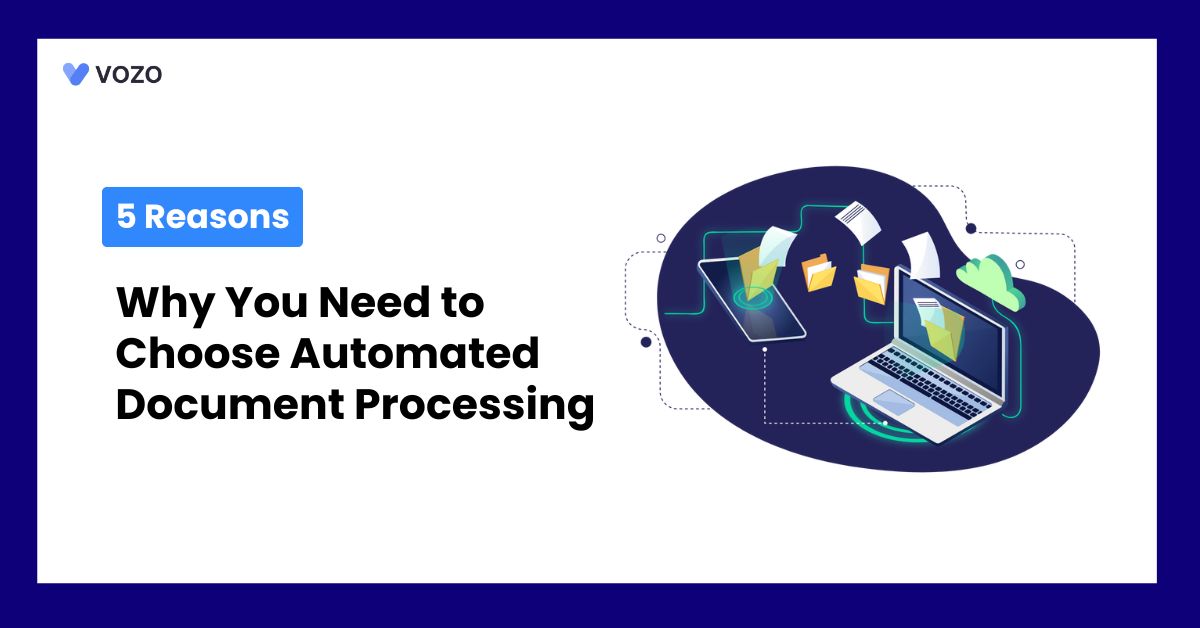5 Reasons Why You Need To Choose Automated Document Processing
Paper-based document processing is increasingly complex in this digital world. Especially for healthcare providers, paper-based documentation neither supports high-quality healthcare delivery nor the basic foundation for clinical advancements.
The best solution for this is to switch to automated document processing, which will create a huge positive impact in delivering care and reduce operating costs.
In this blog, we’ll explain what document automation is, explore the challenges of manual documentation, and explain why you need to implement automated document processing in your healthcare practice.
What Is Automated Document Processing?
Intelligent Document Processing in healthcare uses artificial intelligence to automate the management of medical records, forms, and other related documents, which reduces manual work and increases efficiency. Some of the key features are given below.
- Systems can accurately extract data from different document types. which includes patient records, lab results, and insurance claims.
- Automation reduces manual data entry and process time. This helps in cost savings, minimizes errors, and streamlines the process.
- Minimized errors lead to accurate data and billing. It ensures data integrity and reduces the risks.
- Automated systems allow rapid access to patient information and facilitate diagnosis and treatment strategies.
- Security measures are implemented which includes data encryption, access controls to protect patient data, and preventing data breaches.
Challenges in Paper-based Documentation
Information exchange plays an important role, but when it is paper-based, records. The physical document exchange presents challenges to all the small, large, and multi-specialty practices. There are some common problems associated with paper documents.
1. Limited Access
Paper records are physically stored in a location, which limits access for providers and patients. Sharing of documents requires physical transfer, which is slow and difficult for collaboration.
2. Inaccuracy and Errors
Data duplication may result in inaccuracies and outdated information. Paper records can contain errors and inaccurate data. Manual data entry can result in the incompleteness of the record.
3. Storage and Security
Paper-based documents require storage space, which can be quite expensive. Paper documents are at risk of being lost, harmed, or accessed without permission.
4. High Costs, Low Efficiency
Paper files consume more time and are inefficient, which delays treatments and impacts patient care. It requires high costs for storing, organizing, and managing all the records.
Related: AI-Powered Documentation Assistance: Automating Charting and Note-Taking in EHR Portals
5 Reasons Why You Need Automated Document Processing
1. Healthcare Data Access Made Easier
A document management system stores all patient records centrally and provides an easy-to-access location. It helps to respond quickly to patients or providers who need to access records immediately.
In a cloud-based management system, users can access documents from any device via the internet. This allows them to go without carrying the paper files. It is easy to collaborate with providers from any location, ensuring that data is transmitted securely.
2. Documentation Automation Reduces Human Error
Streamlining the documentation process minimizes the likelihood of human mistakes. There are tools to make the process efficient, and they can automatically correct errors in the documents. This minimizes the chance of losing a document as its data is backed up on servers.
Automated systems keep track of changes, prevent issues, and can restore the data submitted previously for patient treatment procedures.
3. Document Processing Can Help Streamline Workflow
As patient records are stored in a centralized area, it is easier for authorized persons to quickly find the documents when they are needed. Automating the clinical documentation streamlines the process, such as billing, claims processing, reduces the time to handle paperwork and retrieve information.
Document storage allows healthcare teams to collaborate and share information instantly, which leads to improved patient care and informed decision-making.
4. Automated Documentation Reduces Overhead Costs
Eliminating the need for paperwork and automating processes through document management systems can save healthcare organizations money. It reduces printing costs and storage space. IDP saves time replacing paperwork, which is difficult for staff members to handle and is time-consuming.
5. Intelligent Document Processing Enhances Compliance
The primary focus for healthcare organizations is patient data. They are required to adhere to HIPAA, GDPR, and other regulatory laws that ensure the secure protection and storage of patient data.
Document management systems protect data security by encrypting sensitive information, such as social security numbers and financial details, while preventing unauthorized access.
Vozo EHR for your Healthcare Practices
From managing and organizing patient health records digitally to reducing medical errors, it significantly empowers providers to improve healthcare quality.
If you are searching for the best EHR system for your healthcare practice, Vozo EHR can be your go-to choice. Our comprehensive EHR solution lets you focus more on patient care while carrying all the burdens and simplifying them.
- Vozo Cloud EHR’s cost-effective cloud subscription benefits all levels of practice.
- Our feature-rich EHR helps you rectify mistakes efficiently and speed up the process.
- Vozo Specialty EHR resonates with specialty practice needs and requirements.
- Our expert technical team has got you covered 24/7 if any needs arise.
- Our EHR System continues to scale as your healthcare practice grows to improve the user experience.
The Vozo Customized EHR solution benefits your healthcare practice by:
- Streamlining the administrative process
- Improving workflow efficiency
- Reducing proneness to errors
- Managing all the patients’ records in one place
- Offers greater efficiency and cost savings across the board.
Our specialty-specific tools, such as scheduling, patient portals, lab integration, cloud hosting, and more, meet the specific needs and requirements of your healthcare practice.
“Embrace Vozo EHR to reduce your burdens and enhance patient care.”
About the author

With more than 4 years of experience in the dynamic healthcare technology landscape, Sid specializes in crafting compelling content on topics including EHR/EMR, patient portals, healthcare automation, remote patient monitoring, and health information exchange. His expertise lies in translating cutting-edge innovations and intricate topics into engaging narratives that resonate with diverse audiences.













